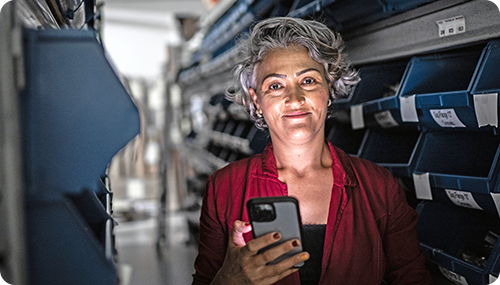Learn more about
Our customers and relationships
In preparing this webpage, we have considered the information available until March 7, 2024.
We enable better experiences by offering smart solutions and collaborative partnerships that champion the customer experience and support community, resiliency and growth.
Responsible procurement and supplier partnerships
Supplier partnerships
Suppliers directly feed our ability to succeed, a critical fact considering the growing constraints on global provisioning. Engaging actively with suppliers to identify opportunities and address risks is key to fostering a sustainable value chain. We work with various key suppliers in order to align with our values and we challenge them to collaborate on innovative projects to drive improvements.
Bell works with suppliers to participate in innovative solutions that seek to minimize the environmental impact of our business operations. This means we work with suppliers to redirect, reuse, repurpose and recycle material from our waste streams wherever possible. We also support organizations that are focused on protecting the environment. For example, Bell works with its utility pole supplier to establish a process for repurposing end-of-life poles. Depending on the condition of the pole, it can be remanufactured into valuable products, including structural beams and guardrails, or alternately, the used poles can be crushed to make wood chips.
Responsible procurement of tangible products and services

In addition to Bell's approach to the responsible business and risk management of its suppliers, Bell also addresses specific products through its expanding sustainable criteria program.
Sustainable criteria for tangible products
Since 2011, Bell has implemented strong environmental and procurement policies in contracts, such that all suppliers with whom we conduct business are bound to standards consistent with Bell’s Supplier Code of Conduct and sustainable criteria for targeted tangible goods and services contracts.
Our sustainable criteria for customer facing products encompasses mobile phones and accessories, batteries, chargers, SIM cards, street furniture, modems and TV receivers, paper and packaging and single-use plastic products, and also extends to internal products including laptops and cleaning supplies.
Conflict minerals
Many electronic devices contain a small amount of metals such as tantalum, tin, tungsten and gold. These are sourced from minerals recognized under U.S. laws as conflict minerals, because in certain cases, these metals are mined in exploitative circumstances. Bell shares the concerns of many companies in the electronics and telecommunications industries, specifically, that the use of conflict minerals may directly or indirectly finance or benefit armed groups in the Democratic Republic of the Congo (DRC) or neighbouring countries.
We consider the exploitation and trade of conflict minerals that fuel armed conflicts and lead to the abuse of human rights as unacceptable. Our policy and practices aim to ensure the appropriate actions are taken so that our suppliers source conflict minerals responsibly. At Bell, our Supplier Risk Management program contains provisions that require that suppliers who provide us with tangible products for resale that contain or may contain tin, tungsten, tantalum or gold, maintain appropriate due diligence controls over conflict minerals in their supply chain such that the products sold to Bell are to be "DRC Conflict Free."
Supplier selection and accountability
Bell Canada (and all its subsidiaries)
To ensure we are working with suppliers who hold a high standards for environmental, social and governance (ESG) best practices, Bell's corporate standard requires that all suppliers must adopt Bell's Supplier code of conduct ("Code"), as well as applicable annexes and environmental clauses. The Code helps minimize risks to our operations and reputation in the following areas: business continuity, information security, privacy, health and safety, environment, labour, human rights and financial stability.
Prior to entering into a contract with our suppliers, we conduct a risk analysis on the supplier through our Supplier Risk Management program. In addition to our internal assessments, Bell may request that the supplier complete a self-assessment questionnaire. The purpose of Bell's risk-based assessment is to determine the level of risk associated with a supplier and the product or service being rendered. Suppliers are assessed on international, national and regional legislation, standards and guidelines. Bell also assesses its suppliers on their handling of sensitive information, the suppliers' occupational health and safety policies, environmental standards, and their emergency preparedness plans and procedures. In addition, Bell requires that its suppliers comply with all applicable statutes, regulations, guidelines, codes of practice, orders and agreements with government authorities relating to the protection and conservation of the environment. These include, but are not limited to, hazardous substances, air emissions, water management, energy consumption and greenhouse gas emissions.
Bell’s Supplier Code of Conduct
All new Bell contracts bind suppliers to standards consistent with Bell's Supplier Code of Conduct, with the expectation that the supplier will take all reasonable measures to respect the requirements of the Code through its own operations and within its own supply chain. Bell's Supplier Code of Conduct was updated in 2020 to reflect the most recent best practices, and outlines standards that seek to ensure that working conditions in our supply chain are safe, that workers are treated with respect and dignity and that design and manufacturing processes are environmentally and ethically responsible. Bell is committed to responsible sourcing, and we consider all activities in our supply chain that fuel conflicts and that lead to human rights abuse as unacceptable. We have also updated the Labour and Human Rights section of our Supplier Code of Conduct to reflect the latest International Conventions, including: Freely chosen employment, Young workers, Working hours, Wage and benefits, Human treatment and non-discrimination and Freedom of association and collective bargaining. If a supplier, or a third party designated by Bell is found to be in default under the Supplier Code of Conduct, Bell may conduct onsite audits of selected supplier facilities that provide products or services to Bell. Onsite audits may include a review of relevant supplier records, policies and work practices, as well as an inspection of the facilities for compliance with the Code. In the case of an observed non-compliance with the Code, the supplier will be required to take all reasonable measures to meet the standards exposed in the Code in a diligent manner or risk termination of its agreement with Bell.
Supporting and equipping children and our communities
Today's young people face challenges that did not exist for earlier generations. To support young people navigating these challenges, Bell partners with a wide range of youth-oriented organizations such as Kids Help Phone, Strongest Families Institute, The Montreal Children's Hospital Foundation, the Canadian Centre for Child Protection and MediaSmarts, in addition to programs such as Computers for Schools in Quebec (OPEQ). Bell Let’s Talk has also partnered with the Graham Boeckh Foundation to support the delivery of mental health services for young people through Integrated Youth Services (IYS) hubs. Bell subsidiary Northwestel also creates lasting partnerships with youth initiatives in the North.
Mental health support for kids
Bell is a Founding Partner of Kids Help Phone (KHP), supporting the mental health and well-being of young people. Bell’s partnership with Kids Help Phone helps to ensure young people have access to e-mental health resources, especially as the need for support has continued to grow. Young people have connected with Kids Help Phone more than 14 million times since the COVID-19 pandemic began, as Canada's only national free, confidential, 24/7, multilingual e-mental health service dedicated to youth.
$15 million
In March 2023, Bell committed $15 million to Kids Help Phone’s #FeelOutLoud Campaign, a historic, national movement anchored by a fundraising campaign with a goal of raising $300 million to reach young people in every corner of Canada by 2024 by expanding access to its e-mental health services. Bell team members also continue to help organize and participate in the Kids Help Phone annual fundraising event.
In 2023, team members from Bell Canada, Bell Media and The Source secured pledges and participated in Walk so Kids Can Talk, raising $255,000. Since 2002, Bell team members have raised more than $11.5 million for Kids Help Phone.
Protection of minors

Bell and Bell MTS contribute approximately $150,000 annually in funding and services to support the operations of the Canadian Centre for Child Protection (C3P), including Cybertip.ca. Cybertip.ca is the national tipline for Canadians to report their concerns about the online sexual abuse and exploitation of children and to raise awareness of the issue so we can better protect children. Since its creation in 2002, Cybertip.ca has processed 400,000 reports from the public. Cybertip.ca has sent 37 million+ removal notices worldwide through Project Arachnid, a victim-centric set of tools that helps reduce the online availability of known child sexual abuse material. Reports to Cybertip.ca skyrocketed during the COVID-19 pandemic. In the first two weeks alone, they increased by 40%. By the end of the 2020 fiscal year, that figure rose to 106%.
In response to this fast-growing demand for services, C3P developed a survivors system that integrates Cybertip.ca staff with C3P support services, and utilizes evidence-based practices to support survivors of online sexual violence from a multidisciplinary lens. NeedHelpNow.ca, supported by Bell since its inception, is one of the primary ways youth reach out to C3P for help when they have experienced online sexual violence, such as the sharing of intimate images, sextortion, and online luring. In the past year, NeedHelpNow.ca received 160,000+ page views, and the survivor support team managed 4,200+ requests for help from survivors, youth, or their caregivers.
In addition to strengthening their support system, C3P actively updates survivor resources, which will include the Self/Peer Exploitation guides, funded in part by Bell. These guides were developed in response to increased reporting to Cybertip.ca regarding sexting incidents. C3P will work on updating the guides to reflect growing concerns surrounding other examples of online sexual violence to best serve youth.
Digital Media Literacy
MediaSmarts is Canada's bilingual centre for digital media literacy and a registered charity. Its vision is to ensure all Canadians have the critical thinking skills to engage with media as active and informed digital citizens. MediaSmarts conducts and disseminate original research that contributes to the development of their resources as well as informs public policy on issues related to digital media; develops internationally recognized educational programs for teachers, parents and general audiences; and conducts awareness-raising activities to further digital media literacy in Canada. They host an annual Media Literacy Week to build public awareness of the importance of digital consumers developing critical-thinking skills.
Bell is a founding partner of MediaSmarts, supporting their ongoing operations that include digital literacy workshops, public awareness campaigns and online resources. In 2023, Bell donated $60,000 to help improve digital media literacy for people across Canada and sponsored the Media Literacy Week. Media Literacy Week is an annual national campaign hosted by MediaSmarts and supported by the Canadian Teachers’ Federation, which facilitates digital parenting workshops, Break the Fake workshops and seminars on topics ranging from AI to cybersecurity organized by over 150 collaborating organizations including libraries, schools, museums and community groups from coast to coast to coast.
Supporting youth in the North

Northwestel is committed to supporting youth sport in the North. The Northwestel Learn to Speed Skate program is offered by the Nunavut Speed Skating Club in Iqaluit. Youth are taught fundamentals of short track speed skating, with a focus on safety and good technique for new skaters. More than 50 youth take part in the program annually. In the Kivalliq region, the Northwestel Rankin Rock Hockey Camp works with about 200 kids aged 8 to 13 every year. Through intensive hockey skills training, office education, goal setting and personal development, the camp creates “better people - not just better players.” In the Yukon, Northwestel sponsors the Whitehorse Cross Country Ski Club Jack Rabbits and Bunny Program. The “FUNdamentals” program is designed to teach youngsters cross-country skiing basics.
Mental health in the North
Northwestel is committed to supporting the North with easy access to mental health support. In Nunavut, Northwestel is a long-time partner of the Kamatsiaqtut help line. Kamatsiaqtut, which translates to “A person who cares,” provides mental health and crisis support service in both English and Inuktitut. Also in Nunavut, Embrace Life Council is a community driven non-profit that tackles the challenge of suicide prevention. In November 2022 the Isaksimagit Inuusirmi Katujjiqaatigiit Embrace Life Council (IIKELC), successfully coordinated their first Peer Leadership program, where the primary focus was to foster youth’s confidence in being supportive peers when receiving disclosures of abuse and thoughts of suicide. Ten youth from across Nunavut spent a week in Iqaluit learning a range of topics including Indigenous community healing, sober living and healthy lifestyles, and cyber bullying.
Northwestel is grateful to have the opportunity to assist in cultivating an environment that connects youth leaders throughout Nunavut to learn, collaborate and gain tools for positive mental health and healthy living. Northwestel supports the Canadian Mental Health Association Yukon Division in the operation of their Counselling program and Reach Out Support Line, a volunteer-based, confidential, non-judgmental and free support line.
Computers for schools in Quebec (OPEQ)
In the last 25 years, OPEQ has:
- recovered more than 50,000 computers per year (over 80,000 in 2023);
- upgraded and distributed more than 333,000 refurbished computers and laptops;
- provided more than 50,000 hours of training per year;
- helped more than 1,000 young people gain work experience through the Ordinateurs pour les écoles du Québec (OPEQ) internship program;
- helped several thousand trainees acquire skills in the information technology field;
- worked with dozens of young people with physical or cognitive limitations in OPEQ's sorting centres and workshop.
Bell and Computers for Schools in Quebec: Partners for over 25 years

In 1993, Industry Canada and the Telephone Pioneers created the Computers for Schools (CFS) program to donate to schools computers no longer needed by the federal government. In 1997, Bell took over the leadership of the program in Québec and became a founding member of Computers for Schools in Québec (OPEQ – Ordinateurs pour les écoles du Québec). It is under this entity that the CFS (now CFS+) program is managed in the province.
This close collaboration has fostered the growth of OPEQ and it has become the most important player in the reuse of electronic equipment in Québec, with two sorting centres (Montréal and Québec) and five workshops (Gatineau, Montréal, Québec, Saguenay and Sherbrooke). Bell helps reduce the digital divide through its strong collaboration with OPEQ, by maximizing the reuse of electronic equipment surplus and ensuring its secure, efficient and environmentally sound management. The value of Bell's donations to OPEQ is over $1.8 million in 2023.
Giving back to the community
Since the program's inception, hundreds of thousands of computers, laptops, printers and cellular devices have been refurbished and redistributed to schools, libraries and non-profit organizations. OPEQ’s mission extends, via targeted programs, to other clients such as low-income families and newcomers, with the goal of supporting digital inclusion and eliminating technological isolation.
Training young people from all over Quebec
The OPEQ internship program provides youth with hands-on responsibilities in information technology to help them gain the skills and experience needed to join the job market. It offers an opportunity for young people with physical or cognitive limitations to gain work experience, a workplace integration that is rewarding for all employees. Several instructors or managers now employed by OPEQ in sorting centres and workshops were successful graduates of this internship program. OPEQ also partners with professional training centres and offers their student participants a work environment that complements the classroom training and motivates against dropping out of school. - Diversity, equity and inclusion are at the heart of the organization's values.
OPEQ for the environment
OPEQ has been mandated to recover computer equipment from provincial and federal ministries as well as para-governmental and municipal agencies. OPEQ also receives equipment from Québec's major companies in technology, communications, pharmaceuticals and finance, among others.
To minimize the negative environmental impacts of electronic devices, OPEQ prioritizes reusing before recycling. Thanks to the companies that have chosen OPEQ for the management of their equipment at the end of its useful life, we have refurbished more than 333,000 computers and laptops over the past 25 years and given new life to computers that would otherwise have been discarded or recycled.
When equipment cannot be reused, it is recycled by audited certified recyclers who meet the highest standards of recycling and proper handling of materials.
Through its support of OPEQ, Bell promotes:
To learn more about Computer for Schools in Quebec, visit www.opeq.qc.ca
Customer choices in a competitive Internet market
Bell supports an open Internet and meets all requirements related to net neutrality as set out by the CRTC.
The CRTC oversees a regulatory framework that is designed to ensure that the key principles of net neutrality are maintained. This includes fostering consumer choice, innovation and the free exchange of ideas. It has been developed over a number of years and is implemented by the CRTC through Canada’s Telecommunications Act. This effectively codifies specific rules for Internet traffic management practices and differential pricing practices.

